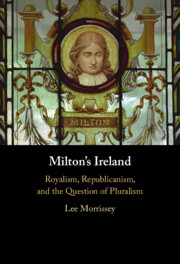Chapter 3 - Early 1649
The Execution of Charles I and Milton’s “Observations” in Articles of Peace
Published online by Cambridge University Press: 14 November 2024
Summary
In January, 1649, James Butler, 1st Duke of Ormond, signed a treaty with the Catholic Confederacy, not knowing that the king on whose behalf he spoke was on trial in London. On January 30, 1649, Charles is executed, and a week later England became a republic, having a nonmonarchical form of government. A Council of State was created, and John Milton was appointed its “Secretary of Foreign Tongues.” The Council charged Milton to write observations on Ormond’s peace treaty and other recent documents from Ireland. The most geographically interesting reflection on Ireland to involve Milton’s work the resulting Articles of Peace offers a map of Ireland, a cultural and political geography overlaid on the ancient provinces of the island, to which Milton adds complicated interisland tensions, on the eve of Cromwell’s invasion of Ireland. Articles reflects the complexity of the situation in Ireland, ramified by English management: A Protestant Royalist signs an extraordinarily generous Peace Treaty with Irish Catholics; the Parliamentary representative in Dublin complains of English influence; the Ulster-Scots make the case for a Protestant Church in Ireland that is neither Anglican nor Episcopalian.
Keywords
- Type
- Chapter
- Information
- Milton's IrelandRoyalism, Republicanism, and the Question of Pluralism, pp. 81 - 103Publisher: Cambridge University PressPrint publication year: 2024

